高一英语必修四-北师大版-模块总结
北师大版高一英语语法(必修一-必修四)
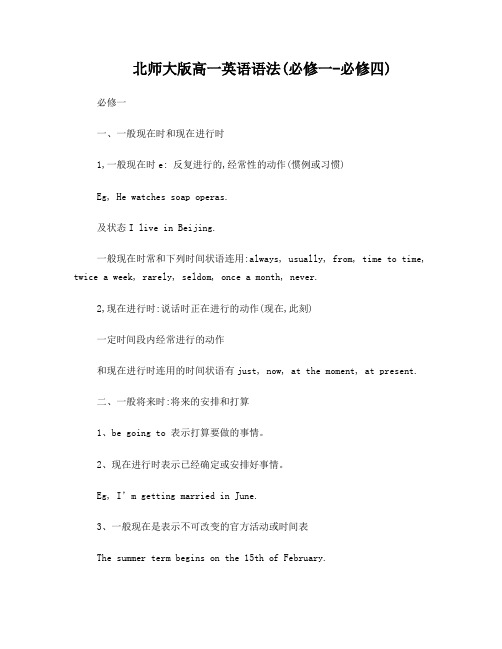
北师大版高一英语语法(必修一-必修四)必修一一、一般现在时和现在进行时1,一般现在时e: 反复进行的,经常性的动作(惯例或习惯)Eg, He watches soap operas.及状态I live in Beijing.一般现在时常和下列时间状语连用:always, usually, from, time to time, twice a week, rarely, seldom, once a month, never.2,现在进行时:说话时正在进行的动作(现在,此刻)一定时间段内经常进行的动作和现在进行时连用的时间状语有just, now, at the moment, at present.二、一般将来时:将来的安排和打算1、be going to 表示打算要做的事情。
2、现在进行时表示已经确定或安排好事情。
Eg, I’m getting married in June.3、一般现在是表示不可改变的官方活动或时间表The summer term begins on the 15th of February.三、一般过去时和过去进行时1,一般过去时:表示过去完成的动作或过去的情境和习惯。
Eg: She climb the stairs and went to her room.用一般过去时要在规则动词词尾加-ed,或用不规则动词的过去式,一般过去式的疑问句和否定句用did 和didn’t 加动词原形。
2、过去进行时:过去某段时间正在进行的动作形成某些事件发生的情境动作。
Eg, It was raining during the whole match.当过去进行时和一般过去时出现在同一个句子中时,过去进行时描述故事发生的背景,儿一般过去时则报道该事件。
Eg,We driving along a country lane when, suddenly a car drove past us.Form: 过去进行时的结构是:主语+was /were +动词-ing形式。
高中英语北师大版选必4第一课重点
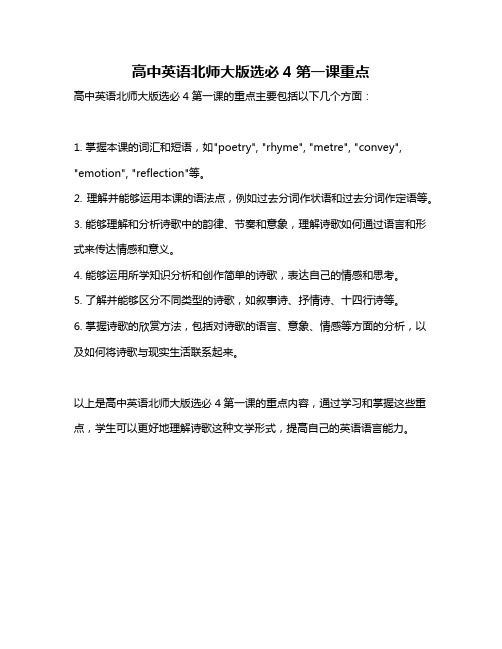
高中英语北师大版选必4第一课重点
高中英语北师大版选必4第一课的重点主要包括以下几个方面:
1. 掌握本课的词汇和短语,如"poetry", "rhyme", "metre", "convey", "emotion", "reflection"等。
2. 理解并能够运用本课的语法点,例如过去分词作状语和过去分词作定语等。
3. 能够理解和分析诗歌中的韵律、节奏和意象,理解诗歌如何通过语言和形式来传达情感和意义。
4. 能够运用所学知识分析和创作简单的诗歌,表达自己的情感和思考。
5. 了解并能够区分不同类型的诗歌,如叙事诗、抒情诗、十四行诗等。
6. 掌握诗歌的欣赏方法,包括对诗歌的语言、意象、情感等方面的分析,以及如何将诗歌与现实生活联系起来。
以上是高中英语北师大版选必4第一课的重点内容,通过学习和掌握这些重点,学生可以更好地理解诗歌这种文学形式,提高自己的英语语言能力。
北师大高一必修模块4 Unit 12

语法
动词-ing形式(作状语、表语、定语、宾语 补足语)
1. __o_w_e____ vt. 欠(情、债等) 2. _a_p_o_lo_g_y__ n. 道歉,认错 3. _a_b_s_o_r_b__ vt. 理解,掌握;吸收 4. _b_r_i_e_f___ adj. 短暂的,简短的 5. _e_x_c_h_a_n_g_e__ vt. 兑换, 交换 6. _w__a_n_d_e_r___ vi. 漫游,闲逛 7. _ta_s_t_y______ adj. 美味的 8. _la_u__g_h_te_r___ n. 笑; 笑声
副词 anyhow, curiously
词汇表 get used to, give ... a lift
短语
课文中
at least, avoid / enjoy / suggest / consider / risk doing sth., afford /
refuse / expect to do sth.
其它:kangaroo, soccer, laughter, mosquito, cave, circus, northeast
动词 exchange, tip, owe, apology, absorb, wander, book, indicate
单词 形容词 brief, tasty, foggy, reasonable, modest, eastern, cosy
Unit 12 Culture Shock
Warm⁃up & Lessons 1-2
指人:waiter, waitress, schoolmate, headmaster, twin, physician 与日常生活有关:blanket, sheet, parcel, handkerchief, mailbox, flashlight, lift, novel, cheque, courtyard, jeep 单词 名词 抽象名词:expectation, majority, request, manners, movement 与食物、烹饪有关:steak, roast, bacon, slice, toast, mushroom, canteen, lemon
最新【暑期特汇·北师大版】高一英语单元知识点复习:必修四-Unit10

单元知识点复习 (Unit 10, Module 4)ExercisesⅠ. 根据句意写出括号内所给单词的适当形式。
1. Stewart was too (drink) to remember anything about the party.2. The whole society should be (concern) about the health and growth of children.3. I felt rather (shame) of myself for getting so angry that day.4. My parents were rather (annoy) that I hadn’t told them about the accident.5. To my (amuse), his false beard fell off when he was performing on the stage.6. This (practice) guidebook teaches you about relaxation and time management. Ⅱ. 介/副词填空。
根据题意,用适当的介词或副词填空。
1. I had injured my leg and had to drop of the race.2. I promise you that I will make everything go back the way it was.3. Come ! One evening at the theatre won’t break the bank.4. You must appeal public opinion to win the election.5. This jacket is a real bargain such a low price.6. Our teacher asked us to make comments the films and write reviews about them.7. Some thanksgiving foods have changed time.8. Many people live on the islet during warm months and make a living fishermen.Ⅲ. 句型巩固。
北师大版高中英语必修四重点语法汇总

必修4重点语法汇总Unit10不定代词some/any/no①some, any作“一些,某个”讲,表示不确定的或未知的数量数目,可用在可数名词和不可数名词前。
some通常用于肯定陈述句中,any用于否定句,疑问句或条件状语从句中。
例:She picked some flowers from the garden.Do you have any money with you?②some可用在表示邀请或请求的句子中,表示希望对方给予肯定回答。
例:May I ask you some questions?③any用于肯定句中,表示“任何(一个)的”。
例:You may come at any time.④no=not a/not any,作定语,后跟可数名词或不可数名词。
例:I have no choice.A lot of/lots of/plenty of/many/much①a lot of, lots of, plenty of意为“许多,大量的”,可用于可数名词复数和不可数名词前。
例:A lot of people say that they live for no purpose.You need to wear lots of warm clothes.There is plenty of time.②many后跟可数名词复数,much后跟不可数名词。
例:He speaks some Chinese, but not much.How many people are there in the room?all/none; both/neither; either①all指三个或三个以上的人或事物,both指两个人或物,在句中都可作主语,宾语,表语,同位语或定语。
例:We are all students.All of us should work hard.②both和all都可直接修饰名词。
北师大版高中英语必修4课件Unit 11 单元重点小结
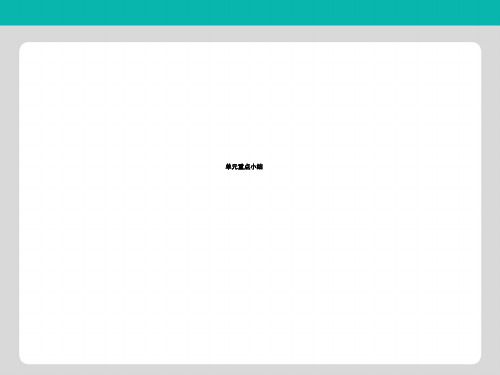
n.证明,证据 adj.明显的 n.解释,说明 vt.解释 vi.发生,出现
过去式
过去分词
vt.为……辩解;保卫 n.为……辩解;保卫 n.争论;理由 vt.争论 n.鼓励 vt.鼓励 n.意见不一;分歧 vt.意见不一;有分歧
44. suitable → suit 45. advertise → advertiser 46. humour → humourous 47. contribution → contribute 48. consideration → consider 49. conclude → conclusion 50. fog → foggy
3.As present-day advertisers often have large budgets , a lot of
money is spent on applying modern techniques of design to make
these advertisements as visually attractive as possible . 当今的广告设计者常常拥有大量的预算资金,他们把大笔的钱用在 现代设计技术上,以使广告在视觉上尽可能地吸引人。
是……意思,代表;支持 支持,赞同 由……组成 突出,显眼 只要 开始做;着手干
重点句型
1.They want the leaders to cancel the debt of Africa’s poorest
countries so that the problems there can __b_e_p_r_e_v_e_n_te_d__fr_o_m___
据利兹大学昨天发表的一项研究称,电视中的不良语言,只要不用
北师大版高中英语必修四重点词汇汇总

必4重点单词和短语汇总Unit10put off 推迟,延期归纳拓展:①put aside 忽视,不理睬,储存He put aside his book and began to listen to me. 他把书放在一边,开始听我讲话。
②put away 将…收起,储存(钱)Put away the tools after work, will you? 工作结束后请把工具收拾好。
③put down 放下,记下,镇压④put forward 提出(意见,建议等)He put forward a very good suggestion at the meeting. 他在会议上提出了一个很好的建议。
⑤put on 穿上,戴上,上演(戏剧)⑥put up 举起,张贴,提供食宿⑦put up with 忍受,容忍2. defeat vt. 战胜,击败,难住易混辨析:①win: 主要指通过努力,斗争,比赛等而获得胜利。
She was determined to win. 她决心要赢。
②beat: 指在游戏,竞赛或战斗中“打败”对手,宾语是指人的名词。
可与defeat互换。
I finally beat her in that match. 在那场比赛中我最终打败了她。
③defeat: 多指在战争,比赛,竞选或辩论中战胜对手,侧重胜利的暂时性。
Our men were heavily defeated in the battle. 我军在此战役中受到重创。
3. earn vt. 挣得,赚得常用结构:①earn sb. Sth. 为某人挣得②earn the name of…赢得…的(美)名③earn money 挣钱,赚钱④earn a living 谋生,活命⑤earn good money/earn well 赚大钱⑥earn a fortune 赚得很多钱,发大财4. determine vt. 确定,决定,下定决心归纳拓展:①determination n. 决心,(正式)决定②determined adj. 有决心的,意志坚定的,坚决的常用结构:①determine sth. 决定/确定某事②determine to to do sth. 决定做某事③determine sb. to do sth. 使某人下定决心做某事④determine on/upon (doing) sth. 决定(做)某事⑤be determined to do sth. 决心做某事He was determined to cut through the difficulties. 他下决心要克服困难。
高一英语必修四_北师大版_模块总结

高一英语必修四_北师大版_模块总结★清华大学★英语系测试:为中小学生英语量身定做.官方网站:清华大学英语教授研究组提供英语必修四模块总结_________________Unit 10. MoneyLesson 1. A Material WorldⅠ Worddetermine. enjoyable. second-hand. concern. hardworking. dormitory. pleased. aware. businessman. stove. drunk. journalist. greedy. popcorn. cigarette. resolution. rude. armchair. carpet. vaseⅡ Phrasegive away 赠送给;泄露(秘密) drop out 退出,退学 be determined to 决心去做dream up 空想 achieve one’s goal 实现目标 be concerned about 关心,挂念turn one’s back on 不理睬,拒绝;背弃,抛弃 be tired of 厌烦Ⅲ Grammar①some/any/no; a lot of/many/muchsome, any ,no a lot of是数量词,用在可数或不可数名词前面。
通常some用于肯定句,any用于否定句。
much用于不可数名词前。
many用于可数复数名词前。
much和many主要用于否定句。
【拓展】修饰可数名词:a number of, a few修饰不可数名词:an(a large) amount of, a great deal, a littlemany a + 单数名词/谓语动词:不止一个=more than one 【例】Don’t travel with large amounts of money.②all/none; both/neitherall, none, both, neither是限定词。
(完整版)北师大版高中英语目录和语法总结

北师大版高中英语目录必修一必修二必修三必修四Unit 1 LifestylesUnit 2 HeroesUnit 3 CelebrationUint4 CyberspaceUint5 RhythmUint6 DesignUint7 The seaUint8 AdventureUint9 wheelsUnit10 MoneyUnit11 The mediaUnit12 Cultureshock1.一般此刻时和此刻进行时2.未来的安排和打算3.一般过去时和过去进行时4.此刻达成时和一般过去时5.被动语态6. have to/ not have to, can/can’ t, ought to/ ought not to1.will and be going to2.条件句 -- 真切条件句( 1)( 2)虚构条件句( 1)3.状语从句 --时间状语从句4.介词5.定语从句( 1)1.定语从句( 2)2.形容词和副词的比较、倍数3.状态或动作动词4.定语从句( 3)5.此刻达成时和此刻达成进行时6.too+ 形容词, not+形容词 +enough7.形容词的次序8.冠词1.不定代词2.不定式3.被动语态的用法和形式4.动名词5.跟动名词或不定式作宾语的动词6.此刻分词1.过去分词Uint13 People 2. 表示推断的神态动词必修五选修六选修七选修八Uint14 Careers 3. 间接引语Uint15 Learning 4.虚构语气(和过去事实相反的假定)1.过去达成时Unit 16 Stories 2. to have/get something done3.过去达成进行时Unit17 Laughter 4.进行时态和非进行时态Unit18 Beauty 5. used to and would6.限制词Unit19 1.名词从句Communication 2.非人称转述构造Unit20 3.未来时 --未来进行时、未来达成时、时间状语从句New Frontiers 4.代词Unit21 5.条件句和混淆条件句Human Biology 6.神态动词和表达法Unit22 1.转述构造Environmental 2.被动语态Protection3.重申句构造:倒装句和分裂句“ it ”Unit23 Conflict 4.表达达成的动词形式Unit24 Society 5.说服上课进度:高一上学期:必修一、必修二高一放学期:必修三、必修四高二上学期:必修五、选修六高三放学期:选修七、选修八。
高一必修北师大英语知识点
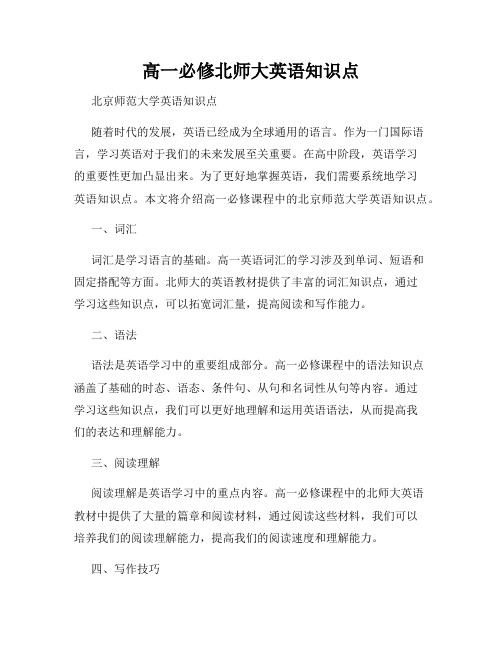
高一必修北师大英语知识点北京师范大学英语知识点随着时代的发展,英语已经成为全球通用的语言。
作为一门国际语言,学习英语对于我们的未来发展至关重要。
在高中阶段,英语学习的重要性更加凸显出来。
为了更好地掌握英语,我们需要系统地学习英语知识点。
本文将介绍高一必修课程中的北京师范大学英语知识点。
一、词汇词汇是学习语言的基础。
高一英语词汇的学习涉及到单词、短语和固定搭配等方面。
北师大的英语教材提供了丰富的词汇知识点,通过学习这些知识点,可以拓宽词汇量,提高阅读和写作能力。
二、语法语法是英语学习中的重要组成部分。
高一必修课程中的语法知识点涵盖了基础的时态、语态、条件句、从句和名词性从句等内容。
通过学习这些知识点,我们可以更好地理解和运用英语语法,从而提高我们的表达和理解能力。
三、阅读理解阅读理解是英语学习中的重点内容。
高一必修课程中的北师大英语教材中提供了大量的篇章和阅读材料,通过阅读这些材料,我们可以培养我们的阅读理解能力,提高我们的阅读速度和理解能力。
四、写作技巧写作是英语学习中的重要技能。
高一必修课程中的北京师范大学英语教材提供了一些写作技巧和范文,通过学习这些知识点,我们可以提高我们的写作水平,培养我们的写作能力。
五、听力技巧听力是英语学习中的难点之一。
高一必修课程中的北师大英语教材提供了一些听力材料和听力训练,通过学习这些知识点,我们可以提高我们的听力水平,培养我们的听力技巧。
六、口语表达口语表达是英语学习中的关键技能。
高一必修课程中的北京师范大学英语教材提供了一些口语训练和交际用语,通过学习这些知识点,我们可以提高我们的口语表达能力,培养我们的交际能力。
总结:通过对高一必修北师大英语知识点的学习,我们可以全面提高我们的英语水平。
掌握词汇、语法、阅读理解、写作技巧、听力技巧和口语表达等知识点,能够使我们更加自信地面对英语学习和应用。
因此,我们应该认真对待高一必修北师大英语知识点的学习,刻苦钻研,不断提高自己的英语能力。
北师大高一必修模块4 Unit 10

句式
It is / was +被强调部分+ that / who +其它成 分 例句:In fact, it is you who have the most
important role to play in stopping Yellow
River erosion
语法 不定式
1. __ea_r_n__ vt. 挣得, 赚得 2. _d_e_t_er_m__i_n_e__ vt. 确定, 决定 3. _e_n_j_o_y_a_b_le__ adj.使人快乐的 4. _c_o_n_c_e_r_n__ vt. 使忧虑; 与……相关 5. __p_l_e_a_se_d__ adj. 高兴的, 满意的
与地域有关:valley, homeland, 名词 motherland, soil
单词
与摄影有关:photography, focus, flash
其它:amusement, balance, importance, freedom, translation, signal
动词 appeal, contain, remove, puzzle, behave, advance, replace
exist, motivate
单词
形容词
与情感、态度有关:aggressive, enthusiastic, ashamed, firm, rude, greedy, pleased, hardworking, enjoyable
其它:aware, second-hand, native, drunk
副词 Fluently
词汇表 out of work, give away, drop out, put off, at present
北师大版高中英语必修4 Unit10 Lesson 4知识点详解
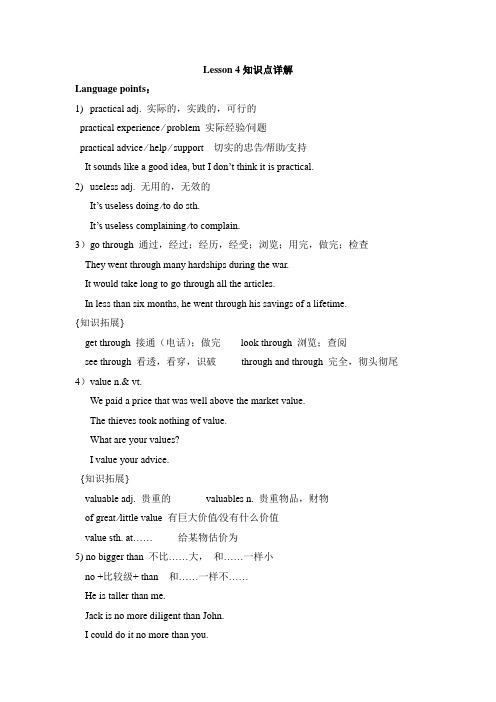
Lesson 4知识点详解Language points:1)practical adj. 实际的,实践的,可行的practical experience ∕ problem 实际经验∕问题practical advice ∕ help ∕ support 切实的忠告∕帮助∕支持It sounds like a good idea, but I don’t think it is practical.2)useless adj. 无用的,无效的It’s useless doing∕to d o sth.It’s useless complaining∕to complain.3)go through 通过,经过;经历,经受;浏览;用完,做完;检查They went through many hardships during the war.It would take long to go through all the articles.In less than six months, he went through his savings of a lifetime.{知识拓展}get through 接通(电话);做完look through 浏览;查阅see through 看透,看穿,识破through and through 完全,彻头彻尾4)value n.& vt.We paid a price that was well above the market value.The thieves took nothing of value.What are your values?I value your advice.{知识拓展}valuable adj. 贵重的valuables n. 贵重物品,财物of great ∕little value 有巨大价值∕没有什么价值value sth. at…… 给某物估价为5) no bigger than 不比……大,和……一样小no +比较级+ than 和……一样不……He is taller than me.Jack is no more diligent than John.I could do it no more than you.6) convenient adj. 方便的,易到达的Will it be convenient for you to start work tomorrow?Our house is convenient for the shopping center.{知识拓展}convenience n.方便,便利inconvenient adj. 不方便的7) put on 穿上,戴上;演出增加若干体重She put her hat and coat on.The local drama group are putting on Hamlet.I put on 2kg last month.{知识拓展}put on, wear, have on 和dressput on 穿的动作wear 穿的状态have on穿的状态,但不用于进行时态dress 表穿,宾语是人,而不是衣服Before he left, he put on the coat that he once had on ten years before.The man wearing a black jacket is dressing the boy.8) find + 宾语+ 宾补宾补可以是形容词、不定式、现在分词、过去分词、介词短语。
英语北师大必修4课件:Unit 10 Money 10单元重点小结
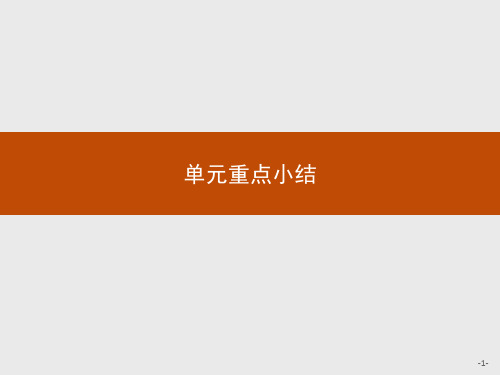
vt.使有动机,促使,激发→
motivation
n.动力,诱因
27. fluently
adv.流利地→
fluent
利的
28.
exist
vi.存在,生存→
existence
在,生存
29. determine
vt.确定,决定→
determined
有决心的
30. concern
vt.使忧虑;与……相关→
concerned
-6-
单元重点小结 重点单词 重点短语 重点句型 重点语法 交际功能
1.
put off
2.
at present
3.
out of work
4.
give away
5.
drop out
推迟 目前,现在 失业 赠送;泄露(秘密) 退出,退学
-7-
单元重点小结
重点单词 重点短语 重点句型 重点语法 交际功能
vt.使困惑→
puzzled
adj.感到
困惑的→
puzzling adj.令人困惑的
34. behave
vi.举止,表现→
behaviour n.举
止,行为
35. advance
vi.前进;取得进展→ advanced adj.
高级的,先进的
36. freedom
n.自由→
free
adj.自由的
37.
drop out
and has
only a little money makes you free.
查尔斯·格雷决定退出富人圈,他发现拥有少量钱会带给人自由。
-8-
单元重点小结 重点单词 重点短语 重点句型 重点语法 交际功能
【暑期特汇·北师大版】高一英语单元知识点复习:必修四 Unit11
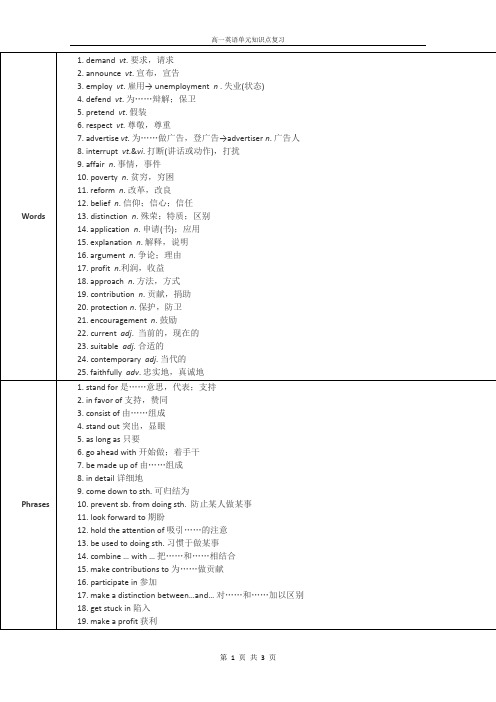
高一英语单元知识点复习:必修四 Unit11ExercisesⅠ. 根据句意,用括号内所给单词的适当形式填空。
1. She’s waiting patiently in the (believe) that he’ll come back.2. When we faced her with all the (evident), she admitted the crime.3. The judge didn’t believe his (explain) that he had stolen the money in order to give it to charity.4. There is no doubt that (employ) has caused damage both to individuals and to com munities.5. If you want to sell your old sofa, you can put an (advertise) in the local newspaper.6. He was honored for his (brave) and honesty as well as his strong support of just cau ses.Ⅱ. 介/副词填空。
1. They were prevented going on holiday by their lack of money.2. You don’t have to worry that all my money to be spent college education might be wasted.3. Scientific discoveries are often applied industrial production.4. More and more mobiles are likely to be linked the Internet.5. The child knelt down to look a coin he had dropped.6. It would be unwise to comment the situation without knowing all the facts.7. Do remember that children should be kept from the river.8. People’s attitudes failure, however, vary greatly from person to person.9. I’ve scanned the report but I haven’t had time to read it detail.10. It describes how the poet made a journey Dumfries to look for inspiration exactlya week before his death.Ⅲ. 句型巩固。
- 1、下载文档前请自行甄别文档内容的完整性,平台不提供额外的编辑、内容补充、找答案等附加服务。
- 2、"仅部分预览"的文档,不可在线预览部分如存在完整性等问题,可反馈申请退款(可完整预览的文档不适用该条件!)。
- 3、如文档侵犯您的权益,请联系客服反馈,我们会尽快为您处理(人工客服工作时间:9:00-18:30)。
英语必修四模块总结_________________Unit 10. MoneyLesson 1. A Material WorldⅠ Worddetermine. enjoyable. second-hand. concern. hardworking. dormitory. pleased. aware. businessman. stove. drunk. journalist. greedy. popcorn. cigarette. resolution. rude. armchair. carpet. vaseⅡ Phrasegive away 赠送给;泄露(秘密)drop out 退出,退学be determined to 决心去做dream up 空想achieve one’s goal 实现目标be concerned about 关心,挂念turn one’s back on 不理睬,拒绝;背弃,抛弃be tired of 厌烦ⅢGrammar①some/any/no; a lot of/many/muchsome, any ,no a lot of是数量词,用在可数或不可数名词前面。
通常some用于肯定句,any用于否定句。
much用于不可数名词前。
many用于可数复数名词前。
much和many主要用于否定句。
【拓展】修饰可数名词:a number of, a few修饰不可数名词:an(a large) amount of, a great deal, a littlemany a + 单数名词/谓语动词:不止一个=more than one【例】Don’t travel with large amounts of money.②all/none; both/neitherall, none, both, neither是限定词。
all用于复数名词和不可数名词前,表示人或物中的每一个或全部、整体。
none of用于复数名词或the+集合名词前。
和none连用的动词可以是单数或复数,但总是用肯定行形式。
表达两人或两物时,用both of和neither of。
·all, none:三者以上·both/neither:双方【例】Both my parents get angry with me, especially my dad.Neither of my parents give me money.She ate all(of) her rice.③another, other, the other, the secondanother, other, the other, second是限定词。
·another:三者以上数目中的“另一个”,用于单数可数名词前,表示“又一个”或“(不同类的)另一个,其他一种”·other:+n. 单复数均可,表示“另外的”、“更多的”·the other:两者中的“另一个”·the second:指第二位的【例】Some people are greedy, other people are generous.I don’t like this pen. I’m going to buy another one.Give me the other one; not this one.ⅣSentence1. A lot of people are determined to become a millionaire.2.But there are people who have turned their backs on their millions and founddifferent ways to be happy on their lives.3.They spend half of their time dreaming up ways of getting rich, and the restof their time thinking about all the enjoyable things they would do once they get rich.4.He was pleased to give up the lifestyle of a rich man.5.He was tired of being a person who had everything in a world where manypeople had nothing.6.Therefore he gave away all his money to charities.7.He decided to drop out and has discovered that having only a little moneymakes you free.Lesson 2. The Right PriceⅠ Wordbargain. cash. product. fax. scarf. necklace. enthusiastic. ashamed. firm. aggressive. groceries. clothing. annoy. salesgirl. salesman. blouse. boot. leather. vest. comment.Lesson 3. Your MoneyⅠ Wordamusement. cookie. appeal. approximately. soil. contain. balance. remove. importance. crop. economy. puzzle. valley. homeland. motherland. behave. advance. diamond. softⅡ Phraseappeal to 使喜欢,吸引be puzzled by 困惑于ⅢGrammar-Infinitives(不定式)不定式(to do)在句中可用作主语、表语、宾语、宾语补足语、定语和状语。
【例】The soil contains materials to keep the natural balance of the area.定语It is a huge job to control Yellow River erosion.主语This helps to develop local economies.宾语On land with rich soil, local farmers can grow crops to make a living.状语He is to go home.表语This has forced many local farmers to move to other areas.宾语补足语ⅣSentence1.Well, if buying a bag of candies or cookies doesn’t appeal to you, how aboutbuying a tree instead?2.You may agree with this point of view.3.What is more, the success of the programme has greatly improved the livesof the local people.Lesson 4. AdvertisementsⅠ Wordpractical. mobile. useless. headphone. wire. bath. signal. freedom. photography. credit card. automatic. focus. flash. noisy. customer. cleaner. refrigeration. electric. kettleUnit 11. The MediaLesson 1. World NewsⅠ Wordagenda. nation. political. widespread. poverty. electricity. AIDS. sex. administration. reform. demand. debt. belief. painful. host. announce. committee. distinction. pub. delighted. publish. incident. evidence. explanation Ⅱ Phrasebe formed by 由……构成in detail 详细地demand reform 要求改革have the distinction of 有……的殊荣come down to 归结为stand for 代表,支持look forward to (高兴地)盼望,期待be responsible for 为……负责ⅢGrammar-The Passive(被动语态)①用法·不知道或不需要强调动作执行者时。
·动作的执行者很明确时。
·要强调动作本身而不是强调谁做的这件事时。
·有时,要强调动作执行者时(人或物),通常在句末用“by+名词”来表示。
②形式·一般现在时:am/is/are done·一般过去时:was/were done·现在进行时:am/is/are being done·过去进行时:was/were being done·现在完成时:has/have been done·过去完成时:had been done·一般将来时:will be done / be going to be done·情态动词can:can be doneⅣSentence1.The G8 is made up of political leaders from…2.In the end, it came down to a choice between Paris and London. Lesson 2. The PaparazziⅠ Wordanalyse. arise. blame. willing. self-employed. legal. attempt. defend. argument. process. profit. analysis. encouragement. onto. attitude. dislike. pretend. hire. bush. respect. disagreement. channelⅡ Phrasein favour of支持,赞同Lesson 3. The Advertising GameⅠ Wordadvertise. classic. certain. sew. beer. corporation. brand. suitable. advertiser. budget. visually. boom. visual. concept. approach. humour. contemporary. contribution. citizen. niece. nephewⅡ Phraseconsist of 由……组成stand out 突出,显眼be likely to 可能be used to 习惯于in direct competition with 与……直接竞争make contribution to society 贡献社会participate in 参加,参与,分享the concept of freedom “自由”的概念ⅢGrammar-Gerunds(动名词)动名词(-ing形式)在句中起名词的作用,可用作主语、表语、定语和宾语(用在动词或介词后)【例】Smoking is terrible habit.主语His hobby is collecting stamps.表语Where is the publishing house?定语We are tired from working all day.宾语注:注意不要混淆介词to和不定时的符号to(do)。
